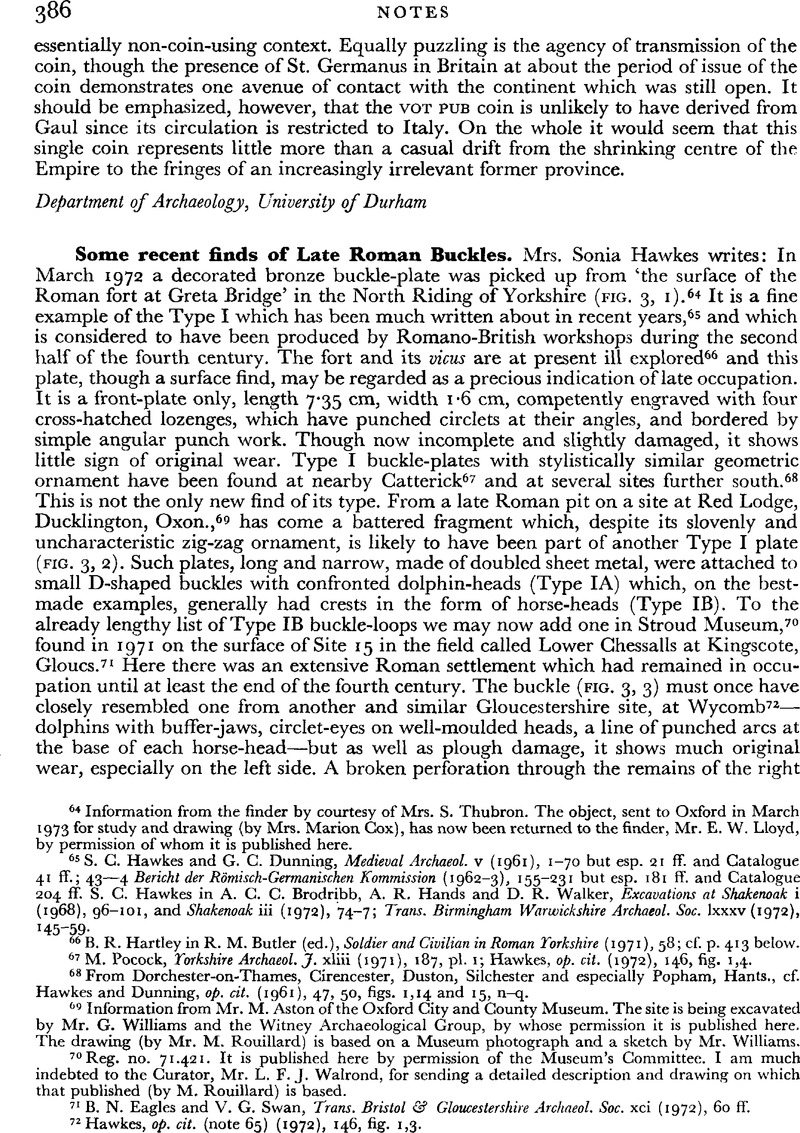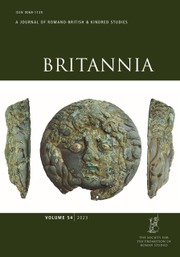Article contents
Some recent finds of Late Roman Buckles
Published online by Cambridge University Press: 09 November 2011
Abstract

- Type
- Notes
- Information
- Copyright
- Copyright © Sonia Hawkes 1974. Exclusive Licence to Publish: The Society for the Promotion of Roman Studies
References
64 Information from the finder by courtesy of Mrs. S. Thubron. The object, sent to Oxford in March 1973 for study and drawing (by Mrs. Marion Cox), has now been returned to t he finder, Mr. E. W. Lloyd, by permission of whom it is published here.
65 Hawkes, S. C. and Dunning, G. C., Medieval Archaeol. v (1961), 1–70CrossRefGoogle Scholar but esp. 21 ff. and Catalogue 41 ff.; 43–4 Bericht der Römisch-Germanischen Kommission (1962-3), 155-231 but esp. 181 ff. and Catalogue 204 ff. Hawkes, S. C. in Brodribb, A. C. C., Hands, A. R. and Walker, D. R., Excavations at Shakenoak i (1968), 96–101Google Scholar, and Shakenoak iii (1972), 74–7Google Scholar; Trans. Birmingham Warwickshire Archaeol. Soc. lxxxv (1972), 145–59.Google Scholar
66 B. R. Hartley in R. M. Butler (ed.), Soldier and Civilian in Roman Yorkshire (1971), 58; cf. p. 413 below.
67 Pocock, M., Yorkshire Archaeol. J. xliii (1971), 187, pl. 1Google Scholar; Hawkes, op. cit. (1972), 146, fig. 1,4.
68 From Dorchester-on-Thames, Cirencester, Duston, Silchester and especially Popham, Hants., cf. Hawkes and Dunning, op. cit. (1961), 47, 50, figs. 1,14 and 15, n-q.
69 Information from Mr. M. Aston of the Oxford City and County Museum. The site is being excavated by Mr. G. Williams and the Witney Archaeological Group, by whose permission it is published here. The drawing (by Mr. M. Rouillard) is based on a Museum photograph and a sketch by Mr. Williams.
70 Reg. no. 71.421. It is published here by permission of the Museum's Committee. I am much indebted to the Curator, Mr. L. F. J. Walrond, for sending a detailed description and drawing on which that published (by M. Rouillard) is based.
71 Eagles, B. N. and Swan, V. G., Trans. Bristol & Gloucestershire Archaeol. Soc. xci (1972), 60 ff.Google Scholar
72 Hawkes, op. cit. (note 65) (1972), 146, fig. 1,3.
73 I am much indebted to Mr. W. T. Jones for showing me this buckle, for sending me further details by letter, 20 January 1974, and allowing me to make use of them in this note. The grave number is 987; the associated brooches a small-long brooch and a brooch of ‘Luton’ type, better known as a Stützarmfibel of Werner's type B, BonnerJahrbücher clviii (1958), 376 ff.Google Scholar
74 Kirk, J. R. and Leeds, E. T., Oxoniensia xviii (1952-1953), 63–76Google Scholar; Hawkes, op. cit. (1972), 150.
75 Evison, V. I., Antiq. Journ. xlviii (1968), 238, fig. 4a, e.Google Scholar
76 Hawkes, op. cit. (note 65) (1972), 150 f.
77 Hawkes and Dunning, op. cit. (note 65) (1961), 21 ff, 50ff, map fig. 9; op. cit. (1962-3), 181 ff, 212 ff, map fig. 9.
78 Clarke, Giles, Antiq. Journ. 1 (1970), 292–8, fig. 4, no. 92.Google Scholar
79 Information from Jeffrey May, 20 September 1967. I am indebted to him for a photograph of the buckle. Cf. also May, J., Antiq. Journ. 1 (1970), 222–45CrossRefGoogle Scholar, for the site generally.
80 J. B. Whitwell, Roman Lincolnshire (1970), 137. I am indebted to him also for information by letter, 7 March 1969, and for copies of drawings of the Lincoln and Dragonby buckles.
81 My thanks to Mrs. E. Fowler for bringing it to my notice after omission from the list in 1961. It is published in Proc. Soc. Antiq. Scotland xlix (1914-1915), 174Google Scholar, fig. 26, 3, from Area B, Level 2 (upper).
82 I am indebted to Dr. R. Reece for permission to publish the buckle and for information about the find context, It came from the garden of Querns Lane House, from a site on the north side of the road dividing Insulae III and IV and including part of that road. Although pottery and coins continued to the end of the fourth century, there was no evidence of any later, post-Roman, occupation. The site was described briefly in Trans. Bristol & Gloucester Archaeol. Soc. lxxv (1956), 203.Google Scholar
83 B. W. Cunliffe (ed.), Fifth Report on the Excavations of the Roman Fort at Richborough, Kent (1968), pl. xxxv, no. 103. V. I. Evison, op. cit. (note 75), 238, fig. 4,i.
84 Giles Clarke, op. cit. (note 78), 295, figs. 4-6; Biddle, Martin, in Vor- und Frühformen der europäischen Stadt im Mittelalter (Göttingen, 1973), 232 ffGoogle Scholar.
85 Mertens, J. and Impe, L. van, Het Laat-Romeins Gravefeld van Oudenburg (Archaeologia Belgica 135, 1971)Google Scholar, pls. XVI, XXV, LII, LXIII, XCII. For a similar knife from Treigne, cf. Dasnoy, J., Annales Soc. archéol. Namur liii (1966), 222Google Scholar ff., fig. 19.
86 Information via Miss Louise Millard, Canterbury Museum, from Mr. J. Bradshaw of the Ashford Archaeological Society. The site is in Charity Field (TR 04944610) and is described as a rubbish-filled hollow, completely sealed and one metre deep, containing ‘a tightly packed deposit of charcoal, animal bones, pottery and small domestic items. Coins are plentiful, many barbarous and fragmentary, the identifiable ones ranging from 323 to 378’. Knife and buckle were found at the same depth and 40 cm apart. There is a brief note in Arch. Cantiana lxxxvii (1972), 233.Google Scholar
87 Hawkes and Dunning, op. cit. (note 65) (1961), 25 f.
88 Hawkes and Dunning, op. cit. (note 65) (1961), 21 f., fig. 6 and (1962-3), 181, Taf. 60, 2-3, 61; Dasnoy, op. cit. (note 85), 218 ff., fig. 17; Bullinger, H., Spätantike Gürtelbeschläge (Bruges, 1969), 67Google Scholar, Abb. 18, 56, Taf. in, XXXI, XXXII, Falttafel A.
89 J. P. Bushe-Fox, Second Report on the Excavation of the Roman Fort at Richborough (1928), pl. XXI, nos. 47 and 52, and Fourth Report (1949), pl. XXXVI, nos. 112-3, pl. LIII, 209; B. W. Cunliffe, op. cit. (note 83), pl. XXXVII, no. 119.
90 Jones, A. H. M., The Later Roman Empire (1964), ii, 566.Google Scholar I am greatly indebted to Dr. John Morris for information on this subject.
91 Corder, P., Arch. Journ. cxii (1955), 20–42.Google Scholar
92 S. S. Frere, Britannia, a History of Roman Britain (1967), 359.
93 Stevens, C. E., in Roman Frontier Studies 1967 (Tel Aviv, 1971), 35 f.Google Scholar; K. M. Martin, Latomus (1969), 408 ff.; S. S. Frere, in R. M. Butler, op. cit. (note 66), 18.
94 Britannia iv (1973), 309.Google Scholar
95 S. C. Hawkes, op. cit. (note 65) (1972), 148 ff.
96 S. C. Hawkes and G. G. Dunning, op. cit. (note 2) (1961), map fig. 4 and (1962-3), map fig. 5.
97 V. I. Evison, op. cit. (note 75), 231-46, pl. LIII.
98 Werner, J., Archaeol. Geographica i (1950), 59Google Scholar. For helpful remarks about the possible use of the Type I buckles in female dress I am indebted to Dr. J. P. Wild, whose ideas, expressed in a letter, 12 December 1972, coincide very closely with my own though we are neither of us prepared to commit ourselves too positively in the present state of the evidence.
- 12
- Cited by


